europeanunion
Latest

Europe's free roaming law won't have time limits
The European Union is back with a second shot at a free roaming plan... and while it addresses key complaints, it's raising concerns of its own. The newly proposed rules would ditch the unpopular time limits in favor of letting carriers compare your roaming habits with how you use service at home. Networks could only ask for surcharges (which top out at €0.04 per call minute, €0.01 per text and €0.0085 per megabyte) if it's clear that you're abusing your roaming access. You'd raise a warning flag if you consume way more data than you do at home, for example, or get SIM cards that remain eerily inactive until you start traveling.
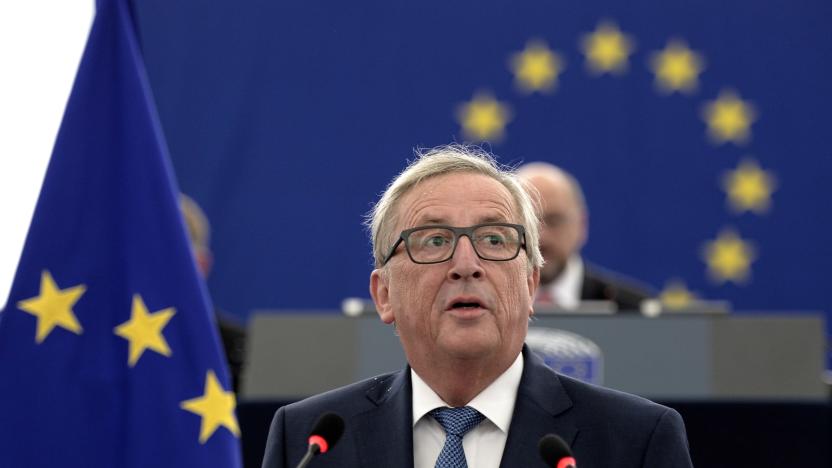
EU digital rules promise 5G, free WiFi and tougher copyright
The European Union isn't done stepping up its digital initiatives. Officials have outlined proposed policies that are focused on dramatically increasing access to both the internet and the content you'll find on it. Most of the proposals will be helpful, although not everyone is a fan -- there are copyright changes that are rubbing Google the wrong way.

Broadband fears prompt Europe to take a big step backwards
Regulators in Europe are considering axing regulations around broadband services in order to foster investment in new fiber optic networks. Reuters claims to have seen an as-yet-unpublished document in which officials ponder relaxing rules surround infrastructure sharing. Currently, companies that install fixed-line broadband to homes are obliged to rent access to other businesses at a fair price. But those firms are aggrieved, saying that the fees aren't enough to justify the initial investment.

EU net neutrality guidelines close key 'fast lane' loopholes
When the European Union passed its net neutrality laws in 2015, it left a few big loopholes that many were worried would undermine the rules. Would your internet provider have free rein to exempt its own services from data caps, for example, or slow down competing services? You might not have to worry quite so much. The EU's electronic communications regulators have posted guidelines that, for the most part, rule out the potential abuses that came from the laws' vague wording.
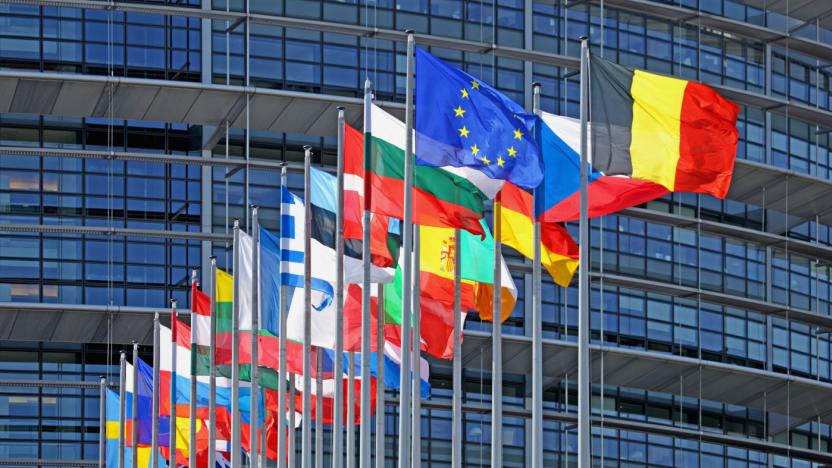
EU will watch Privacy Shield for a year before challenging
Earlier this month, the European Commission adopted Privacy Shield, an EU-US data privacy agreement. It allows companies like Facebook and Twitter to move EU data to US servers, all the while assuring Europeans their data is still as protected as it was back home. Critics have complained the new arrangement has many of the same flaws as the "Safe Harbour" framework it replaces, and EU data protection authorities had yet to comment on the final deal.

The EU-US Privacy Shield is up, but its future is in doubt
After much argument and discussion, the European Commission (EC) today adopted the Privacy Shield, an EU-US agreement that's supposed to protect the rights of Europeans whose personal data is transferred to the US. It's necessary because laws in the US aren't on par with Europe when it comes to data protection. With the agreement in place, companies like Facebook and Twitter can now freely move information between regions while ensuring that Europeans' rights are upheld.
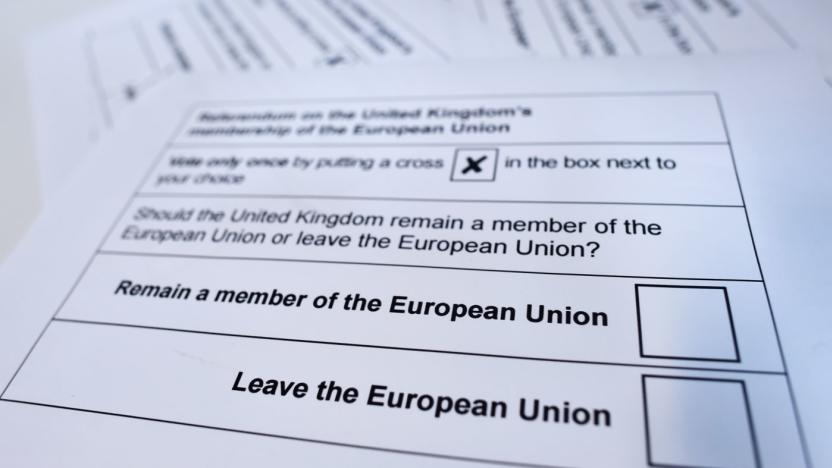
Registration for EU referendum vote extended after site meltdown
The window for online registration to vote in the upcoming EU referendum has been extended after the portal crashed late last night. Many tens of thousands of visitors hit the site shortly after David Cameron and Nigel Farage were finished airing their respective views on the referendum live on ITV. The huge influx brought the website down around 10.15PM, and normal service did not resume until after the registration deadline of midnight. However, thanks to emergency legislation, registration remains open and the Prime Minister is encouraging people to keep signing up. The extension will last until midnight tomorrow (June 9th), so head over to the site when you get a chance if you want your say in the referendum on June 23rd.

Tinder is helping Brits understand the EU referendum
Nothing gets a Tinder match swooning like a well-informed political debate. Quite fitting, then, that the dating app has added a new, temporary feature for UK users to help them to brush up on EU referendum issues when they've exhausted their daily Super Like allowance. In collaboration with non-profit Bite the Ballot, Tinder has created a true-or-false quiz covering key topics such as benefits and human rights -- with the idea being you swipe your way to a better understanding of the key issues ahead of the referendum vote on June 23rd.

EU advises members to be more friendly with Uber and Airbnb
A yet-to-be-released European Union proposal advises member countries to be a bit more open to sharing companies like Uber and Airbnb. According to the guidelines Reuters and The Financial Times got their hands on, the commission wants its members to resort to only ban sharing companies as a last resort. Part of the proposal reads: "Total bans of an activity constitute a measure of last resort that should be applied only if and where no less restrictive requirements to attain a public interest can be used."
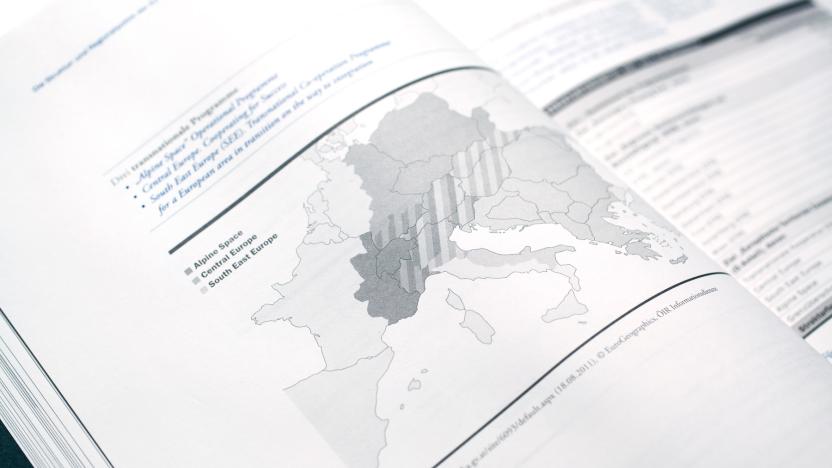
Europe will make publicly funded scientific research public
European Union (EU) ministers have agreed to make a huge amount of scientific research in the region available free of charge by 2020. The move will open up publicly funded papers and articles to a wide audience, helping individuals and businesses to make use of scientific insight. It'll also make it simple for universities (and news publications, like this one) to access papers without having to pay heavy fees. It's called Open Access, and it's a big deal.

A single European market won't lead to a single European Netflix
Today the European Commission (EC) published a large number of proposals in its ongoing pursuit of a Digital Single Market -- the notion that a person or company in one European nation should be able to buy goods from any person or company in another. Chief among them were new rules regarding geoblocking that would make it easier to access sites from other European countries. But while this might simplify things for a Brit who wants to buy video games in France, for example, it's not likely to make a huge difference when it comes to streaming services, which the EC has identified as one of the areas "most affected by geoblocking."

The EU might force Netflix and Amazon to show more local titles
The European Union is rewriting its broadcasting rules, and according to Reuters, it could end up requiring streaming services operating in the region to change their practices. Netflix, Amazon Prime Video and similar companies could be forced to ensure that EU-made shows and movies make up 20 percent of their catalogues in member countries. They'd also have to prominently feature those titles on their websites and apps. But that's not all: the commission wants to oblige them to make financial contributions towards the production of European shows, as well.

Google reportedly faces a record antitrust fine in Europe
It's growing increasingly likely that Google will face European Union fines for allegedly abusing its dominance of internet search, but just how big will the penalty be? Huge, if you ask the Telegraph's sources. They claim that the European Commission expects to fine Google "in the region of" €3 billion ($3.4 billion) -- that's an all-time high for an EU antitrust payout, and far larger than previous record-setter Intel (which paid the equivalent of $1.4 billion). The massive sum would reflect the length of Google's perceived abuse, and might even "make an example" out of the company for supposedly implementing changes that made it even harder for competitors to get noticed in search results.
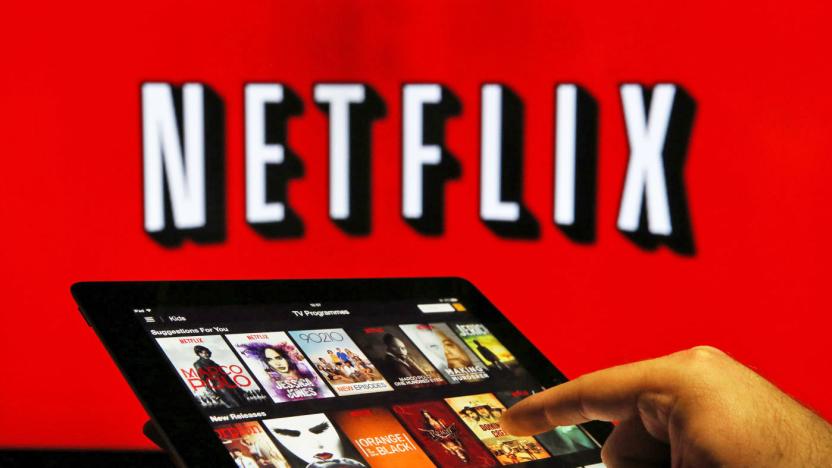
EU agreement lets travelers watch Netflix like they're at home
Most streaming services aren't very useful when you leave your home country. If you don't lose access entirely, you'll probably be forced to look at unfamiliar content and equally unfamiliar languages. However, that shouldn't be a problem in the European Union as of next year. EU member states have tentatively agreed to a proposed law that would require temporary roaming access to subscription streaming services in 2017, complete with the content that you're used to from back home. If you're a British traveler, for instance, you could watch Netflix's UK library while sunning yourself on a Spanish vacation.

EU court upholds new rules that ban e-cigarette advertising
E-cigarettes received one of their biggest endorsements to date last week, with the UK's Royal College of Physicians vouching for their safety and recommending smokers be encouraged to make the switch. Any celebrations within the vaping industry will have been short-lived, though, as yesterday the EU's Court of Justice cleared new legislation that puts e-cigarettes under similar regulatory pressures as your traditional cancer sticks. Many of the rules are simply to ensure product quality, but the biggest blow to manufacturers will undoubtedly be a broad ban on advertising and other promotional activity.

Roaming within the EU has just become cheaper
European decision-makers have been forcibly capping mobile roaming charges in the region for several years now. The last mandated reduction came into effect in July 2014, but today the European Commission has made calls, texts and megabytes that much cheaper once again. The maximum a carrier can now charge you for answering a voice call when you're roaming in another EU country is €0.0114 per minute. Similarly, €0.05 per minute for an outgoing call, €0.02 per SMS and €0.05 per megabyte are the maximum charges you can expect on top of what you'd pay at home.

EU invests 1 billion Euros to make quantum computing practical
The European Union doesn't want to simply wait around while scientists figure out the fundamentals of quantum computing; it's giving the concept a big financial boost, too. The European Commission has revealed plans for a €1 billion ($1.13 billion) "quantum technologies flagship" that, like other EU-level efforts, aims to turn scientific discoveries into practical realities. The Commission expects the project to help everything from motion sensors in phones to virtually unhackable communications. Honest-to-goodness quantum computers are some of the long-term goals, the EU says.
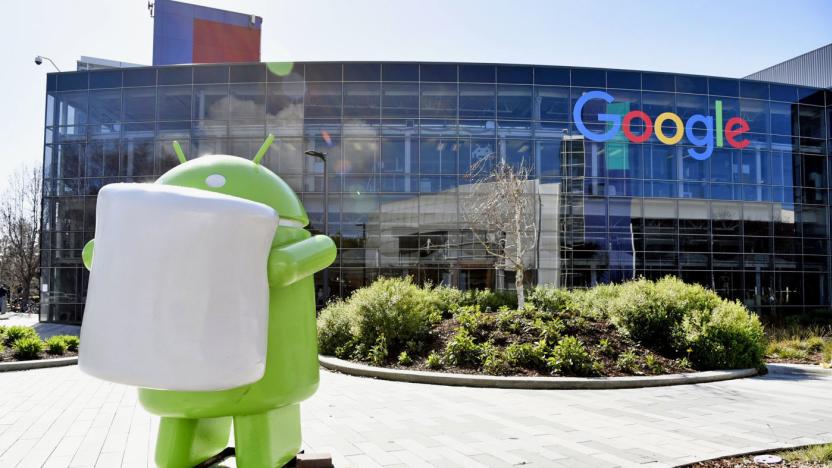
EU close to slapping Google with antitrust charges over Android
The European Union's probe into a possible antitrust case against Google over Android might just lead to full-fledged legal action. Reuters sources claim that the European Commission is getting ready to charge Google for allegedly offering unfair deals to Android phone makers in order to keep its own services on top. While it's not clear just when those charges might drop, the EU is already indicating its main point of contention. It's not so much concerned about Google's demands for app bundles (if you want one Google service, you have to include a bunch more) as it is the exclusive contracts that Google supposedly makes with phone brands to get those bundles in place. These hurt companies' ability to choose which apps they want to load, according to regulators.

EU approves stricter data-protection rules
The European Parliament today voted in favor of broad new data-protection laws that apply to any company operating within the European Union, regardless of where it is based. First proposed more than four years ago, they represent a significant modernization of regulations drawn up in 1995, long before the internet and digital services had matured to the point they're at now. Various EU authorities agreed upon the rules late last year, and they were formally green-lit today. At their heart, the rules make companies more accountable for data protection and give citizens more control over the information held on them.

Google changes how it scrubs 'right to be forgotten' people
Google confirmed today that it is adjusting how it handles "right to be forgotten" requests from EU citizens. Since 2014, when EU's Court of Justice established its "right to be forgotten" law, Google has been scrubbing information deemed "inadequate, irrelevant, no longer relevant or excessive and in the public interest" from its European servers. That means if someone in France makes a delisting request, Google will scrub that info from Google.fr, Google.uk and the rest -- but not from its global Google.com.





